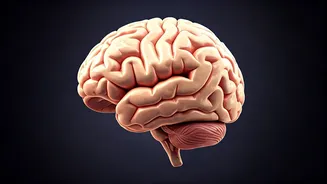Brain Waste Clearance
The brain, like any complex system, generates waste products. This waste, which includes proteins and other cellular debris, needs to be efficiently cleared
away to maintain optimal brain function. When the brain's waste clearance mechanisms falter, these waste products can accumulate, potentially leading to a cascade of problems. Research indicates that disruptions in this clearance process can significantly elevate the risk of developing dementia. This process is crucial because it ensures the brain remains clear of harmful substances. The lymphatic system plays a critical role in clearing waste, and any issues within it can directly impact the brain. Regular sleep, exercise, and a healthy diet can positively affect waste removal, supporting the brain's natural cleansing mechanisms and promoting better cognitive health.
Dementia: Risk Factors
Dementia isn't a single disease but a collection of symptoms linked to impaired brain function. A variety of factors can elevate the risk of developing dementia, and problems with waste clearance are emerging as a major contributor. The buildup of waste products within the brain interferes with the normal operation of neurons, potentially leading to cognitive decline. Other factors include genetics, age, lifestyle, and underlying health conditions such as cardiovascular disease and diabetes. These factors may interact with the waste clearance process to increase the risk. While some factors are beyond individual control, others, like lifestyle choices, can be modified to reduce the overall risk. Making conscious efforts to improve brain health is increasingly important due to the aging population.
Lifestyle: Dementia Prevention
Several lifestyle choices can help support brain health and potentially lower the risk of dementia. Adequate sleep is vital, allowing the brain to clear waste during rest, a process known as the glymphatic system. Regular physical exercise boosts blood flow to the brain, which in turn helps in waste removal and overall brain function. A balanced diet rich in fruits, vegetables, and omega-3 fatty acids provides essential nutrients for brain health. Engaging in mental activities, such as puzzles, reading, and learning new skills, keeps the brain active and may strengthen cognitive resilience. Managing chronic conditions, like diabetes and hypertension, is essential because they can impair brain health. Combining these lifestyle changes can enhance overall brain health and reduce the risk of cognitive decline.
Future Research, Interventions
Ongoing research is focusing on understanding the mechanisms of waste clearance and developing interventions to improve it. Researchers are exploring potential drug therapies aimed at enhancing the efficiency of waste removal from the brain. Other areas of interest include non-pharmacological interventions like transcranial magnetic stimulation and optimizing the sleep environment. Early detection of cognitive decline is crucial for timely intervention, and scientists are refining diagnostic methods to identify problems before they become severe. The goal of future studies is to identify effective strategies and tools to prevent or delay the onset of dementia. This includes new strategies to target waste removal pathways and enhance the brain's self-cleansing abilities. Such innovations can lead to better outcomes for individuals at risk.













